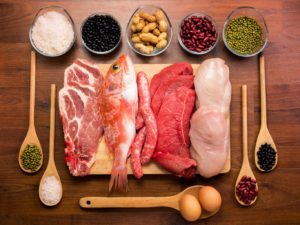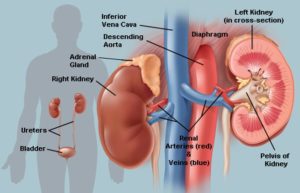
I watched a Jamcore DZ’s video and I learned a lot of stuff.
When I started to train in a gym. I often asked myself this question: « How much protein do I have to eat at each meal ? ». I asked this question to people in the gym and I had several different answers. For example, someone told me that if I ate too much protein, it could destroy my kidneys or that whey (shaker) was better protein than protein from food (chicken, beef, eggs, etc).
I think you also ask yourself this type of questions so I will help you understand better.
Firstly, everyone knows that protein is very used in fitness and bodybuilding. You can find protein in food or as a dietary supplement such as whey, casein, and amino acids. Protein is composed of amino acids.
1) How much daily protein is recommended for someone who doesn’t do fitness?
It’s 0.8 grams (gr) of protein per kilogram (kg) of body weight or 0.36 grams per pound. For this article, I will use the unit of measure kilograms (kg).
I will take the example of Jamo who is a former professional bodybuilder who continues to train. Jamo weighs 95kg. 95kg at 0.8gr per kilo of bodyweight gives as a result that Jamo eats 76gr of protein per meal. Jamo want to keep his bodybuilder body without steroids. For this, he must eat several times a day and that makes a total of 360gr per day.
2) With sport, do these recommendations change?
Yes, because a sedentary person will use more of his/her body, which means that this person will use more his/her muscles. The meals content changes with the sport and the type of sport. If we compare a person who is doing fitness and a person doing marathons, we see that the meals are different.
A person doing marathons needs to eat more carbohydrates than protein to have endurance. A person who does fitness/bodybuilding needs to eat more protein than carbohydrates for muscle rebuilding and muscle growth.
3) Depending on the intensity, do these recommendations change?
Depending on the intensity, the answer is yes and no. It also depends on the muscle mass. When a person is doing a really intensive workout, the most important macro is carbohydrates.
An increase in protein is necessary when a person decreases carbohydrates to be shredded. Increase protein helps maintain muscle mass.
4) With age, these recommendations change?
With the latest scientific studies, we learned that proteins need to be increased with age. When a person starts to become old, that person loses muscle mass naturally (and it’s normal). It’s for this reason that it’s important to play sport to maintain muscle mass. And to help to maintain this muscle mass, it’s necessary to increase protein.
This a scientific study about it, click here.
5) Consume a large amount of protein destroys kidneys?
The answer is yes and no. In a case where a person has pre-existing kidney problems before playing a sport, it’s important to see a nephrologist (kidney specialist) or a doctor. For people who have healthy kidneys, proteins don’t destroy the kidneys. Kidneys are the most detoxifying organs of the human body and we (human beings) have been created to eat meat. The human being is made to eat a lot of meat. Until now, no study has shown that the protein destroys kidneys, except for people with pre-existing kidney problems.
Here is a scientific study on the effects of high protein intake on the kidneys, click here . This study shows that is a myth and a lie.
6) Assimilation and MPS (mass protein synthesis)
Assimilation is when you eat protein. A part of the protein you eat will be assimilated for protein synthesis. Everything else, your body will assimilate because your body is made of 80% amino acids, so these proteins will be used for your skin, your hair, your eyes, your organs. Absolutely all the protein that you eat will be absorbed by your body, nothing is thrown away. There is no protein in your pee.
The goal of protein synthesis is to repair or eliminate damaged proteins and to build new proteins that are copies of the original. New proteins are stronger, denser and more resistant to stress. Muscle Protein Synthesis (MPS) is the reconstruction of muscles caused by stress placed on the body. This can be an injury (muscle tear) or because you intentionally damage a muscle (lifting weights creating micro-tears in muscles). MPS process activated right after micro-tears and can last up to 48 hours on a damaged site before being repaired.
A part of the protein you eat is used for protein synthesis, which will create a state of hypertrophy with hormones. Protein synthesis doesn’t build muscle, it’s muscle protein synthesis (MPS).
I just read again my text and I see that it’s a bit difficult to understand (for me too ?!?). To make it simpler, protein synthesis repairs your skin, your hair, your eyes, your organs and creates a state of hypertrophy. Muscle protein synthesis repair only your muscles.
Here is a scientific study on nutrition and muscle protein synthesis, click here .
7) Liquid and solid protein
Liquid proteins are whey and casein (shaker). Solid proteins are chicken, beef eggs, etc. The difference is that the body assimilates liquid proteins faster than solid proteins. The problem is that the quality of liquid proteins is 75% bad on the market, so it’s up to you to study ingredients (as for food in supermarkets) to find the best quality possible. I wrote an article on this subject, click here.
8) Number of grams of protein per meal
- For men, it’s about 30-35gr of protein per meal. For women, it’s about 20-25gr of protein per meal.
- For older men, it’s about 35-40gr per meal. For older women, it’s about 25-30gr per meal.
Here is an interesting study for women. Eating a large amount of protein has harmful effects on the bones. Click here .
Share this article if you think it can help someone you know. Thank you.
-Steph

